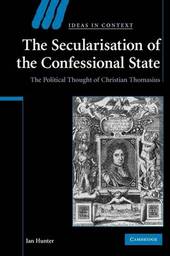
|
The Secularisation of the Confessional State: The Political Thought of Christian Thomasius
Paperback / softback
Main Details
| Title |
The Secularisation of the Confessional State: The Political Thought of Christian Thomasius
|
| Authors and Contributors |
By (author) Ian Hunter
|
| Series | Ideas in Context |
|---|
| Physical Properties |
| Format:Paperback / softback | | Pages:236 | | Dimensions(mm): Height 229,Width 152 |
|
| Category/Genre | Social and political philosophy |
|---|
| ISBN/Barcode |
9780521200837
|
| Classifications | Dewey:323.442092 |
|---|
| Audience | | Professional & Vocational | |
|---|
| Illustrations |
Worked examples or Exercises
|
|
Publishing Details |
| Publisher |
Cambridge University Press
|
| Imprint |
Cambridge University Press
|
| Publication Date |
27 October 2011 |
| Publication Country |
United Kingdom
|
Description
Christian Thomasius (1655-1728) was a tireless campaigner against the political enforcement of religion in the early modern confessional state. In a whole series of combative disputations - against heresy and witchcraft prosecutions, and in favour of religious toleration - Thomasius battled to lay the intellectual groundwork for the separation of church and state and the juridical basis for pluralistic societies. In this text, Ian Hunter departs from the usual view of Thomasius as a natural law moral philosopher. In addition to investigating his anti-scholastic cultural politics, Hunter discusses Thomasius' work in public and church law, particularly his disputations arguing for the toleration of heretics, providing a revealing comparison with Locke's arguments on the same topic. If Locke sought to base toleration in the subjective rights protecting Christian citizens against an intolerant state, Thomasius grounded it in the state's duty to impose toleration as an obligation on intolerant citizens.
ReviewsReview of the hardback: 'Hunter's excellent book offers the first really convincing account of Thomasius' political thought in any language. It is a major contribution to our understanding of the early German Enlightenment and to the development of German political thought.' Joachim Whaley, The English Historical Review
|